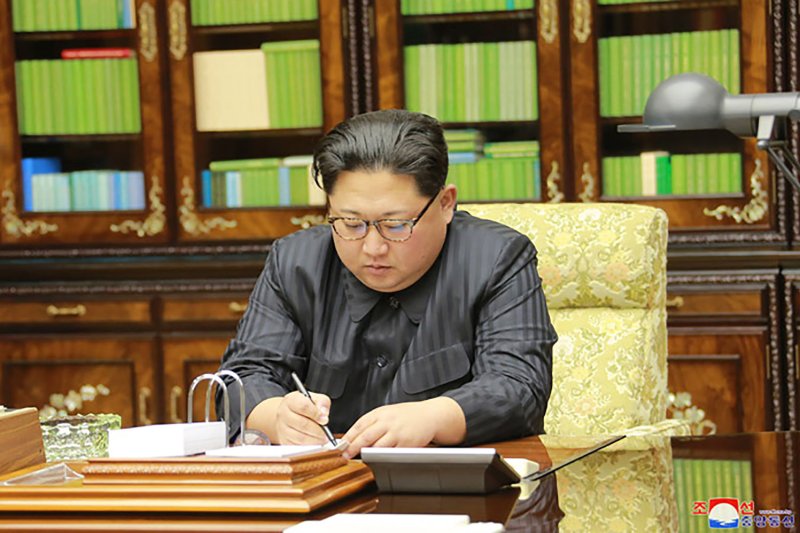Kim Jong Un has called on the United States to recognize the regime as a de facto nuclear weapons state. File Photo by KCNA/UPI |
License Photo
NEW YORK, Jan. 26 (UPI) -- North Korea's lack of willingness to give up its nuclear weapons program does not mean U.S. recognition of the regime as a de facto nuclear weapons state will end the standoff on the peninsula.
That is the view in the Trump administration, according to analyst John Park at the Harvard Kennedy School, who spoke on Thursday at the Asia Society on the economic symbiosis that characterizes the China-North Korea relationship.
"With respect to living with a nuclear North Korea, very strong voices in the U.S. administration right now have an equation," Park told UPI.
"It's Kim Jong Un equals irrational, plus unable to be deterred, plus revisionist, plus commercial.
"That means he's literally crazy so you can't get into some kind of arrangement."
In 2017, North Korea repeatedly called for recognition as a nuclear weapons state, a move which, according to Pyongyang, could put an end to its missile tests and other provocations.
Park said recognition is not seen as the solution in Washington.
"In the case of North Korea it's a millennial with nuclear ICBMs," he said, comparing Kim Jong Un to other nuclear powers like China and Russia that are considered to be more rational actors.
"That is frightening to any military or national security professional."
That Kim is regarded as a revisionist also means the United States cannot be certain of a peaceful coexistence with North Korea as a full fledged nuclear weapons state.
"There is the view that Kim Jong Un will be a nuclear bully, using conventional and other weapons to get his way and eventually affect [Korean] unification on North Korea's terms," Park said.
"Also once he has a viable weapons system, he'll sell it."
Michael Swaine, senior fellow at the Carnegie Endowment for International Peace, said the United States has to decide what policy to pursue based on an evaluation of North Korea strategy.
"The issue is possession versus use," Swaine said.
If it is weapons possession, but not use North Korea seeks, then the United States will also need to develop a strategy to deal with Pyongyang, a plan that needs to "deter the hell out of them, contain them."
"But [the weapons] are going to be there," Swaine said.
Sanctions have been used frequently by the U.S. Treasury to pressure North Korea, and on Wednesday another 16 individuals, nine companies and six ships were added to the expanding blacklist.
But Park said governments should be aware of the "unintended negative consequences of sanctions" that only help North Korea develop "superbug traits, certain types of resistance" to economic penalties.
"Clearly sanctions are having an impact on key areas," Park said.
"However in other areas if you make the analogy of sanctions as antibiotics, applying these antibiotics on the North Korean regime in key instances, the regime is exhibiting superbug traits."
Park, a former investment banker, said some Chinese entrepreneurs may be doubling down at a time of heightened risk.
"As you apply more sanctions in this specific area these Chinese private companies see that as a business opportunity," Park said.
"They view the elevated risk as a way of propositioning a North Korean client."
The analyst added economic pressure in the form of wholesale embargoes, rather than targeted sanctions, has put the sanctions approach on overdrive, although the measures may be "too late" because of advancements in the nuclear program, which in turn leaves military pressure as the "last policy option standing."
That scenario could raise the likelihood of war, a view held by some experts in China, Swaine said.
In an ongoing national debate in the world's second-largest economy, there are those who "believe North Korea has been compelled to adopt policies because of U.S. pressure, U.S. forces on the peninsula," the analyst said.
"It also reflects a deep suspicion of the United States."
Swaine, who has met with senior Chinese officials to discuss North Korea, added Trump's mention of the military option for North Korea is a tactic that is making the Chinese nervous.
"The Trump administration is very unclear...but it thinks it can squeeze the Chinese more" through the mention of the military option, he said.
But the Chinese are also growing impatient with North Korea.
President Xi Jinping, who Trump once described as a "very good man," has refused to meet with Kim Jong Un.
"That's quite unprecedented," Swaine said, explaining China's peninsula policy has also been driven by a desire to improve relations with the South.
"The Chinese see that the Korean peninsula eventually, if it's unified, will largely be unified under the aegis of the South Korean government.
"In other words [they see] the North Korean government isn't going to succeed."















